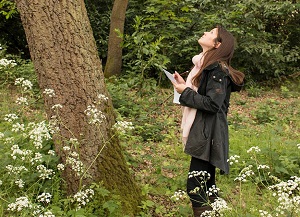Helping wildlife among key motivations for citizen scientists
Release Date 20 May 2016

A study on the motivations for ‘citizen scientists', who volunteer their time to support scientific research, has found that ‘helping wildlife in general' and ‘contributing to scientific knowledge' were primary motivations for the hundreds of thousands of volunteers who give up their time on a regular basis to gather millions of environmental records.
Understanding Motivations for Citizen Science, led by the University of Reading's Department of Geography & Environmental Science, investigated reasons why 147 citizen scientists gave their time to gather information for scientific research. Other motivations include enthusiasm, enjoyment, and skills development, and organisational factors relating to feedback and good project management as vital to maintaining participation.
Interviews with ‘professionals' in citizen science found that they were motivated by advancing science and improving policy and management but also held altruistic motivations around education, engagement and generating impact for their participants' lives.
Lead researcher, Dr Hilary Geoghegan from the University of Reading said:
"There has been a lot of debate and discussion around the quality of citizen science data, such as how useful is citizen data, but there has been very little examination of why do people get involved in citizen science projects, and in particular, the motivations of the scientists, policymakers and project leaders who design and lead these initiatives. For citizen science to be successful, projects need to know what makes their participants tick."
'For citizen science to be successful, projects need to know what makes their participants tick' -- Dr Hilary Geoghegan
Dr Geoghegan added:
"Citizen science is mentioned in a number of government plans for tree health and plant biosecurity, pollination and air quality. Tree health citizen science projects such Observatree, AshTag and OPAL's Tree Health Survey have all recruited volunteers to help monitor the absence and presence of pests and diseases across the country, successfully identifying Chalara ash dieback and oriental chestnut gall wasp.
"As one scientist we interviewed stated, ‘If we couldn't work with citizen scientists, what would we put in its place? How could we cope without them?' Research on citizen scientist motivations can ensure that these initiatives meet their objectives, produce good quality data and value their participants."
The research has been conducted by the University of Reading in partnership with the Stockholm Environment Institute based at the University of York and the Centre for Floods, Communities and Resilience at the University of the West of England, Bristol. It was funded by the UK Environmental Observation Framework.
Vicky Morgan, UKEOF’s programme manager, said: “UKEOF is pleased to have commissioned this research, which deepens our understanding of how to work with citizens to gather evidence to protect our environment.”
The full project report and summary document can be downloaded at http://www.ukeof.org.uk/resources/citizen-science-resources/guide-to-citizen-science-form.
If you're interested in finding out more, please contact Dr Hilary Geoghegan: h.geoghegan@reading.ac.uk